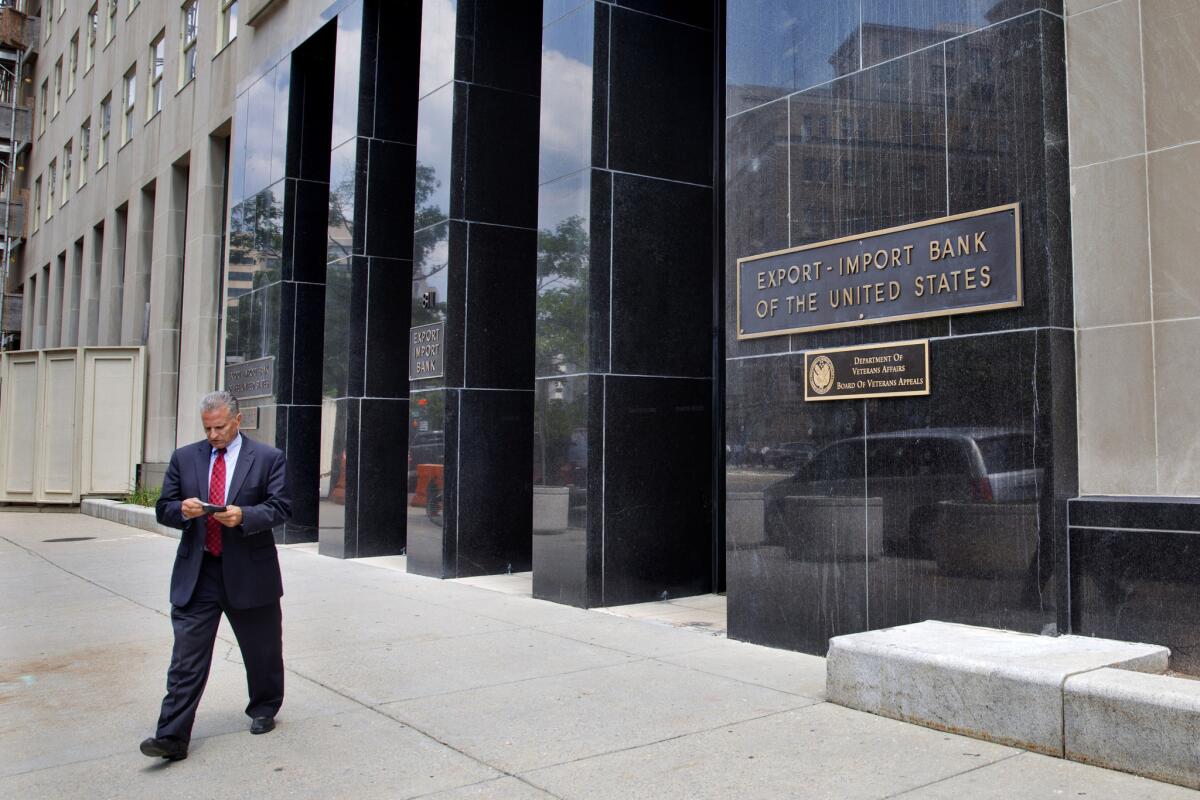Export-Import Bank close to reopening after House includes authorization in highway bill

A man walks out of the Export-Import Bank in Washington on July 28.
Reporting from Washington — The controversial Export-Import Bank, shuttered for more than four months, moved closer to reopening Thursday after a five-year extension of its charter was included in a highway spending bill that passed the House.
The Senate included a similar reauthorization in its version of the highway bill this summer. It would allow the bank to resume providing loans and other assistance to foreign buyers of U.S. products.
Now those two bills must be reconciled by a House-Senate conference committee in the coming days. With strong bipartisan majorities supporting the bank in each chamber, the reauthorization is expected to be included in the final bill.
The highway bill, which would fund infrastructure projects for six years, passed the House, 363-64.
The U.S. Chamber of Commerce and other business groups have lobbied hard for the bank to reopen after opponents succeeded in blocking attempts to reauthorize it before its charter expired on June 30.
“Manufacturers need every competitive tool to grow and create jobs; the Ex-Im Bank is one of those tools and has yet again earned bipartisan support in Congress,” said Jay Timmons, president of the National Assn. of Manufacturers.
“As the bill goes to conference, we urge lawmakers to keep Ex-Im reauthorization as part of the final language,” he said.
Conservatives say the bank dispenses corporate welfare and mostly benefits large exporters, such as Boeing and General Electric while putting taxpayers on the hook for future losses on the assistance.
But supporters say it is crucial to the ability of U.S. firms to compete with foreign companies backed by similar government export-assistance agencies in dozens of other countries.
The conference process gives opponents one last chance to keep the bank closed by trying to remove the authorization from the highway bill.
Conservatives have pointed to the bank’s closure as a major accomplishment in their efforts to shrink the federal government, noting they succeeded in ending a program begun by Franklin Roosevelt.
“The bank is not needed,” Heritage Action for America, a conservative group, wrote to lawmakers this week in urging them to oppose the highway bill.
Key House Republicans, including Majority Leader Kevin McCarthy of Bakersfield, opposed the bank and for months refused to allow a vote to reauthorize its charter.
But pro-business Republicans joined with nearly all House Democrats to use a rare procedural tool known as a discharge petition to force a vote last week. The legislation easily passed, 313-118.
In July, the Senate voted, 64-29, to approve similar language as an amendment to its version of the highway bill. Senate Majority Leader Mitch McConnell (R-Ky.) said he would not take up the House’s bill, so supporters succeeded in attaching it to the highway funding legislation.
The bank said it provided $20.5 billion in loans and other assistance last year to finance $27.5 billion worth of U.S. exports.
Taxpayers provide no money to the bank, which is funded by interest and fees and sent $675 million in profits to the U.S. Treasury last year. But the government is on the hook for any losses the bank can’t cover on about $122 billion in outstanding assistance.
Since the charter expired on June 30, the bank has been unable to provide any new assistance but has continued to service existing aid.
The reauthorization would make some changes to the way the bank operates to try to address concerns of opponents. The changes include reducing the bank’s overall lending cap to $135 billion, from $140 billion, and increasing the percentage of aid provided to small businesses to 25%, from 20%.
Conservatives this week tried to make additional changes with a host of proposed amendments in the House, but bank supporters defeated all of them.
Follow @JimPuzzanghera on Twitter
More to Read
Inside the business of entertainment
The Wide Shot brings you news, analysis and insights on everything from streaming wars to production — and what it all means for the future.
You may occasionally receive promotional content from the Los Angeles Times.











